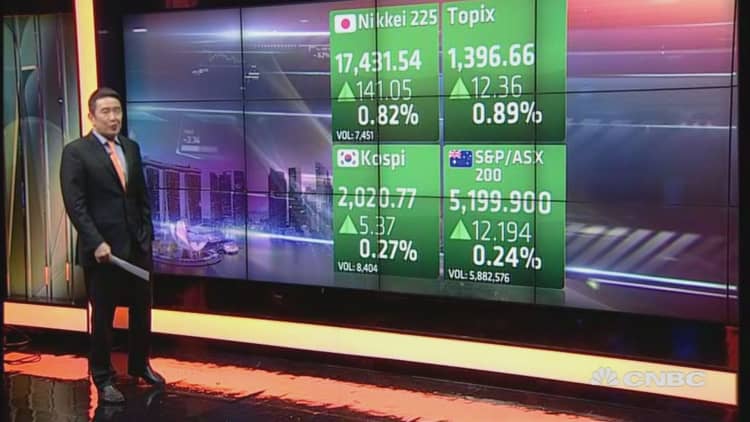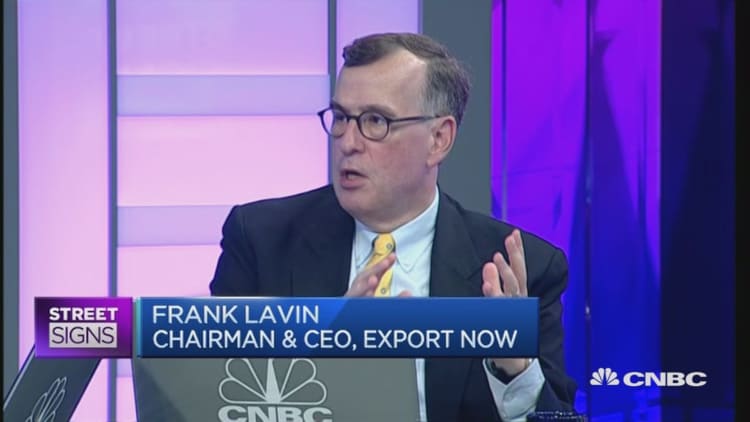
Japanese shares sold off and the yen surged against the dollar Thursday after the Bank of Japan's (BOJ) decision to keep monetary policy steady disappointed a section of the market betting on further stimulus.
The benchmark closed down 624.44 points, or 3.61 percent, at 16,666.05, compared with a 1.41 percent gain before the decision. The Topix index finished down 43.75 points, or 3.16 percent, at 1,340.55.
The yen moved sharply higher, with the dollar/yen pair dropping 2.97 percent to 108.14 as of 3:15 p.m. HK/SIN, compared with the 111 level it traded at before the decision.
Australia's ASX 200 closed up 37.69 points, or 0.73 percent, at 5,225.40, boosted by advances in the energy and materials sub-indexes. In South Korea, the Kospi fell 14.47 points, or 0.72 percent, at 2,000.93. In Hong Kong, the traded flat as of 3:15 p.m. HK/SIN.
Chinese mainland markets retreated, with the closing down 7.46 points, or 0.25 percent at 2,946.20, while the Shenzhen composite dropped 2.20 points, or 0.11 percent, to 1,874.30.
Following the BOJ's decision, and the yen's subsequent strength, major Japanese exporters saw their shares tumble. Toyota closed down 3.27 percent, Nissan fell 4.31 percent and Honda was down 4.18 percent. A stronger yen is usually a negative for exporters as it reduces their overseas profits when converted into local currency.
"However, in the last ten years, Japan's exporters' currency sensitivity has been reduced," Masakazu Takeda, portfolio manager at Hennessy Japan Fund told CNBC's "Capital Connection."
Takeda said as an example, every time the dollar weakened by 10 yen, Toyota's operating profits declined by about 13 percent. "That's down from 20 percent ten years ago," he said, adding, "Companies have been making efforts to reduce the currency sensitivity."
Japanese banking stocks also sold off sharply, with shares of Mitsubishi UFJ closing down 5.95 percent, SMFG down 6 percent and Nomura shares tumbling 10.05 percent. Nikkei index heavyweight Fast Retailing sold off 5.79 percent.
"I suspect the BOJ gave into the domestic uproar that negative interest rates policy are destabilizing the currency markets, along with negatively impacting local banks," said Stephen Innes, a senior foreign exchange trader for APAC at OANDA, after the decision. "Big business won this round."
Innes added that BOJ is likely to take a "wait and see approach" to see the full effect of its current interest policy and that it will "likely unleash a massive stimulus package at a later date."
"I suspect we could see a bottoming on this recent dollar/yen capitulation in 108.50-109.00 range," he said.
Prior to the BOJ decision, government data showed Japan's core consumer price index, which excludes fresh food prices, dropped 0.3 percent on-year in March. Reuters said economists' median estimate was for a 0.2 percent annual gain.
Elsewhere, early morning Thursday, the Reserve Bank of New Zealand (RBNZ) left its official cash rate unchanged at 2.25 percent.
In its monetary policy statement, the central bank said the global growth outlook had deteriorated due to weakness in China and other emerging markets. The bank expects local inflation to strengthen as "effects of low oil prices drop out and as capacity pressures gradually build."
The benchmark NZX 50 closed up 39.58 points, or 0.58 percent, to 6,789.98, while the climbed 2.17 percent to $0.6978 in the evening local time, following the RBNZ decision.

In the currency market, the dollar index, which measures the dollar against a basket of currencies, dropped 0.63 percent to 93.791 as of 3:22 p.m. HK/SIN, compared to its previous close at 94.387.
The U.S. Federal Reserve opted not to raise interest rates on Wednesday local time, citing a slowdown in economic activity stateside. The Federal Open Market Committee's (FOMC) statement highlighted the many conflicting signs in the economy that included consistent job growth and an improving housing market but slowdowns in business investment and exports.
"The Fed statement was incrementally more hawkish than its March statement, removing its concerns about "global and financial developments"," said Angus Nicholson, a market analyst at IG.
Kathy Lien, managing director of foreign exchange strategy at BK Asset Management, said the Fed's statement was a positive for the greenback. "Global troubles no longer worry the Fed, putting them one step closer to raising interest rates," she said.
The Australian dollar was up 0.88 percent at $0.7650 as of 3:24 p.m. HK/SIN, after dropping close to 1.8 percent at one point in the Wednesday session following fresh probability of monetary easing from the Reserve Bank of Australia (RBA) after inflation unexpectedly fell.
Ray Attrill, global co-head of foreign exchange strategy at the National Australia Bank, said following the drop in consumer price index on Wednesday, the bank now expects "a 25 basis points reduction in the Cash Rate (to 1.75 percent)" when the RBA meets next week.
Elsewhere, the Australian dollar/Japanese yen cross tumbled 2.04 percent to 82.79 in the late afternoon local time, following the BOJ decision. The euro/yen cross fell 2.58 percent to 122.90.
In company news, shares of Mitsubishi Motors advanced 6.40 percent Thursday, beating the main index, but remain down over 50 percent year-to-date.
On Wednesday, the company announced earnings for the financial year that ended in March 2016. Operating income was up 1.8 percent on-year to 138.4 billion yen ($1.2 billion), above expectations of 129.62 billion yen, according to a Thomson Reuters survey. Mitsubishi, however, did not issue an earnings guidance for the current financial year.
Earlier in the week, the troubled Japanese automaker said an internal investigation found it had falsified mileage tests since 1991. But on Thursday, the automaker said its vehicles sold in the United States from 2013 have accurate mileage readings, according to Reuters.
Smartphone maker Samsung Electronics reported an 11.7 percent on-year increase in first quarter operating profit to 6.68 trillion won ($5.82 billion). Operating profit of its mobile division was up from a year earlier to 3.89 trillion won, while operating profit for its semiconductor business fell from 2.93 trillion won in first quarter of 2015 to 2.63 trillion won.
Samsung shares closed down 2.69 percent.
Oil prices retreated during Asian hours, with U.S. crude futures down 0.60 percent at $45.06 a barrel, while global benchmark Brent was down 0.78 percent at $46.81 as of 2:35 p.m. HK/SIN.
Energy plays finished mixed, with Santos adding 3.52 percent, Woodside Petroleum up 0.98 percent and Chinese mainland shares of Sinopec closed down 2.56 percent. Japanese oil stocks saw steep losses, with Inpex down 3.02 percent.
Overnight, the closed up 0.28 percent and the S&P 500 added 0.16 percent, while the closed down 0.51 percent.
— Jeff Cox contributed to this report.




